Overview
In the demanding world of healthcare, providers often face emotional challenges that can affect their ability to deliver quality patient care. Administrative burdens can weigh heavily, detracting from the time and attention they wish to dedicate to their patients. This is where EHR transcriptions come into play, offering a compassionate solution to alleviate some of these pressures.
The article highlights seven key benefits of EHR transcriptions for healthcare providers:
- Improved accuracy
- Time savings
- Enhanced patient engagement
- Cost efficiency
- Compliance and security
- Elevation of patient care quality
Imagine a scenario where administrative tasks are streamlined, allowing for better communication between providers and patients. This not only reduces errors but also fosters a more supportive environment for everyone involved.
These benefits are supported by evidence showing that EHR transcriptions can lead to improved health outcomes and operational efficiency in healthcare settings. As healthcare providers, you deserve tools that enhance your ability to care for your patients. By embracing EHR transcriptions, you can focus more on what truly matters—providing exceptional care.
Consider how much smoother your workflow could be if these solutions were integrated into your practice. Wouldn’t it be reassuring to know that you’re not only saving time but also enhancing the quality of care you provide? We encourage you to explore the potential of EHR transcriptions and see how they can transform your daily operations, ultimately benefiting both you and your patients.
Introduction
In the ever-evolving landscape of healthcare, many providers find themselves increasingly burdened by administrative tasks. These responsibilities can detract from their primary focus: delivering quality patient care. It’s a challenge that weighs heavily on their hearts. EHR transcriptions present a transformative solution, offering the promise of streamlined documentation processes that enhance both accuracy and efficiency in patient records. Yet, as healthcare professionals navigate the complexities of integrating these advanced systems, a crucial question arises: how can EHR transcriptions truly elevate the quality of care while alleviating the overwhelming administrative load?
This question is not merely about technology; it speaks to the core of what healthcare providers strive to achieve. The emotional toll of excessive paperwork can lead to burnout, impacting not only the providers but also the patients who rely on them. By addressing these administrative burdens, we can create an environment where healthcare professionals feel supported and empowered to focus on what truly matters—their patients.
Imagine a world where documentation is seamless, allowing providers to spend more time with patients and less time on paperwork. EHR transcriptions can help make this a reality. They streamline the documentation process, reduce errors, and ultimately lead to better patient outcomes. As we explore this topic further, let’s consider how embracing these solutions can transform the healthcare experience for both providers and patients alike.
CosmaNeura: Streamline Administrative Tasks with Intelligent EHR Transcriptions
In today's demanding healthcare environment, providers often face overwhelming administrative burdens that detract from their ability to focus on patient care. CosmaNeura's advanced EHR documentation services are here to help. By streamlining the record-keeping process, these services allow medical professionals to concentrate on what truly matters: meaningful interactions with their clients.
Imagine the relief of simplifying administrative duties such as client intake and documentation. This not only decreases the time spent on non-clinical responsibilities but also enhances operational efficiency. Such improvements foster a more streamlined workflow, aligning perfectly with the mission of delivering .
With the medical sector grappling with an estimated $250 billion in expenses to manage 30 billion transactions each year, the need for effective solutions is clear. Organizations are investing approximately $20 in labor for every paper document filed. This reality underscores the essential role of EHR transcriptions in alleviating the administrative load that often interferes with quality care.
By adopting these advanced solutions, healthcare professionals can reclaim valuable time, ultimately boosting their job satisfaction and improving outcomes for those they serve. Reducing administrative burdens not only enhances job satisfaction but also promotes professional wellbeing for medical practitioners. This transformative impact reinforces the importance of CosmaNeura's services in today's healthcare landscape.
Are you ready to embrace a solution that supports your dedication to compassionate care? Let’s work together to ease the administrative challenges and focus on what truly matters: the health and wellbeing of your patients.
Enhanced Accuracy: Achieve Reliable Patient Records with EHR Transcriptions
EHR records significantly enhance the precision of medical documents, ensuring that every clinical interaction is carefully documented. This level of precision reduces the risk of errors often associated with manual data entry and miscommunication. With of 99.9%, healthcare professionals can trust that their client records reflect the true clinical picture. This trust is essential for effective diagnosis and treatment planning.
Organizations that have adopted robust transcription services report a noticeable decrease in misdiagnoses and treatment errors. This underscores the transformative impact of accurate documentation on patient safety. Moreover, healthcare providers emphasize that reducing mistakes in clinical documentation not only enhances individual safety but also streamlines workflows. This allows them to focus more on delivering quality care and alleviating burnout.
To further ensure accuracy, medical organizations are encouraged to conduct regular internal audits of their EHR systems. Additionally, leveraging AI tools like virtual assistants and chatbots can significantly enhance documentation processes. Furthermore, adhering to HIPAA compliance is crucial for maintaining trust and meeting legal standards.
By implementing ehr transcriptions, medical facilities can ensure that every interaction is recorded precisely. This ultimately leads to improved health outcomes and increased confidence in the medical system. Healthcare professionals are urged to embrace these solutions to enhance their workflow and elevate the quality of care they provide.
Key Solutions to Consider:
- Conduct regular internal audits of EHR systems.
- Utilize AI tools to streamline documentation.
- Ensure HIPAA compliance to maintain trust.
By taking these steps, you can create a more efficient, compassionate healthcare environment that prioritizes patient safety and well-being.
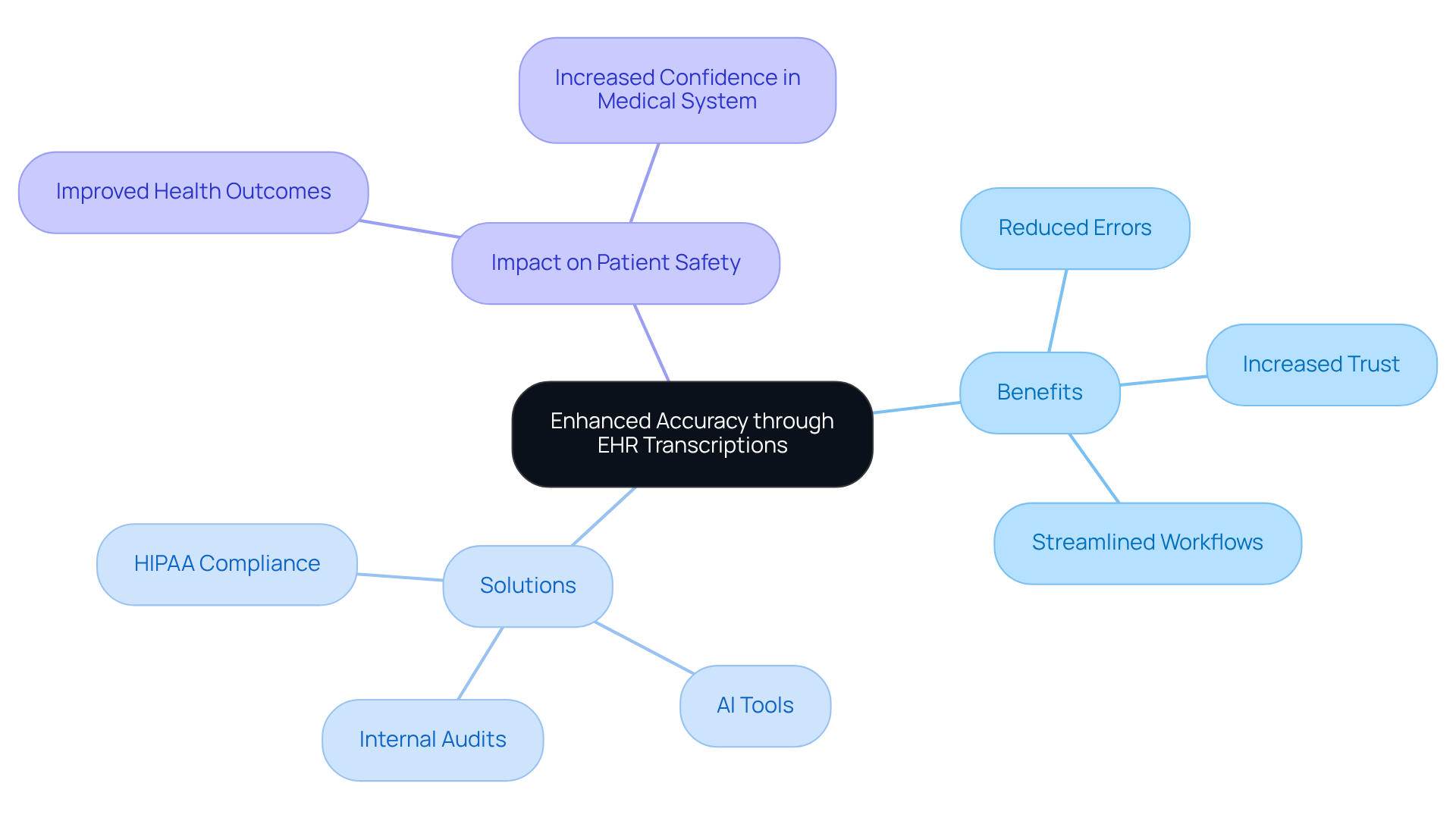
Time Savings: Maximize Clinical Time with Efficient EHR Transcription Services
Healthcare providers often face overwhelming administrative burdens that can detract from their primary mission: patient care. Utilizing can save medical professionals an average of one hour daily. This time, reclaimed from documentation tasks, can be redirected towards meaningful interactions with patients. How much more could you engage with those you serve if you had this time back?
A 2024 survey by AMIA reveals that 74% of medical professionals feel documentation interferes with patient care. This statistic highlights the pressing need for streamlined processes. By automating recording tasks, clinicians can focus on what they do best—providing high-quality care. Yet, many medical startups struggle to gain approval from risk-averse physicians hesitant to adopt new technologies.
Consider this: healthcare professionals using AI-powered documentation tools have reported an average decrease of 5.6 minutes per appointment in total EHR time, as observed in a study at Brigham and Women’s Hospital. This reduction not only maximizes clinical time but also enhances client interactions, leading to improved satisfaction in practice.
Moreover, the implementation of AI-written records can alleviate clinician fatigue. This underscores the necessity for effective documentation solutions, such as ehr transcriptions, and illustrates how innovation can coexist with high-quality care. By embracing these advancements, you can transform your practice and foster deeper connections with your patients.
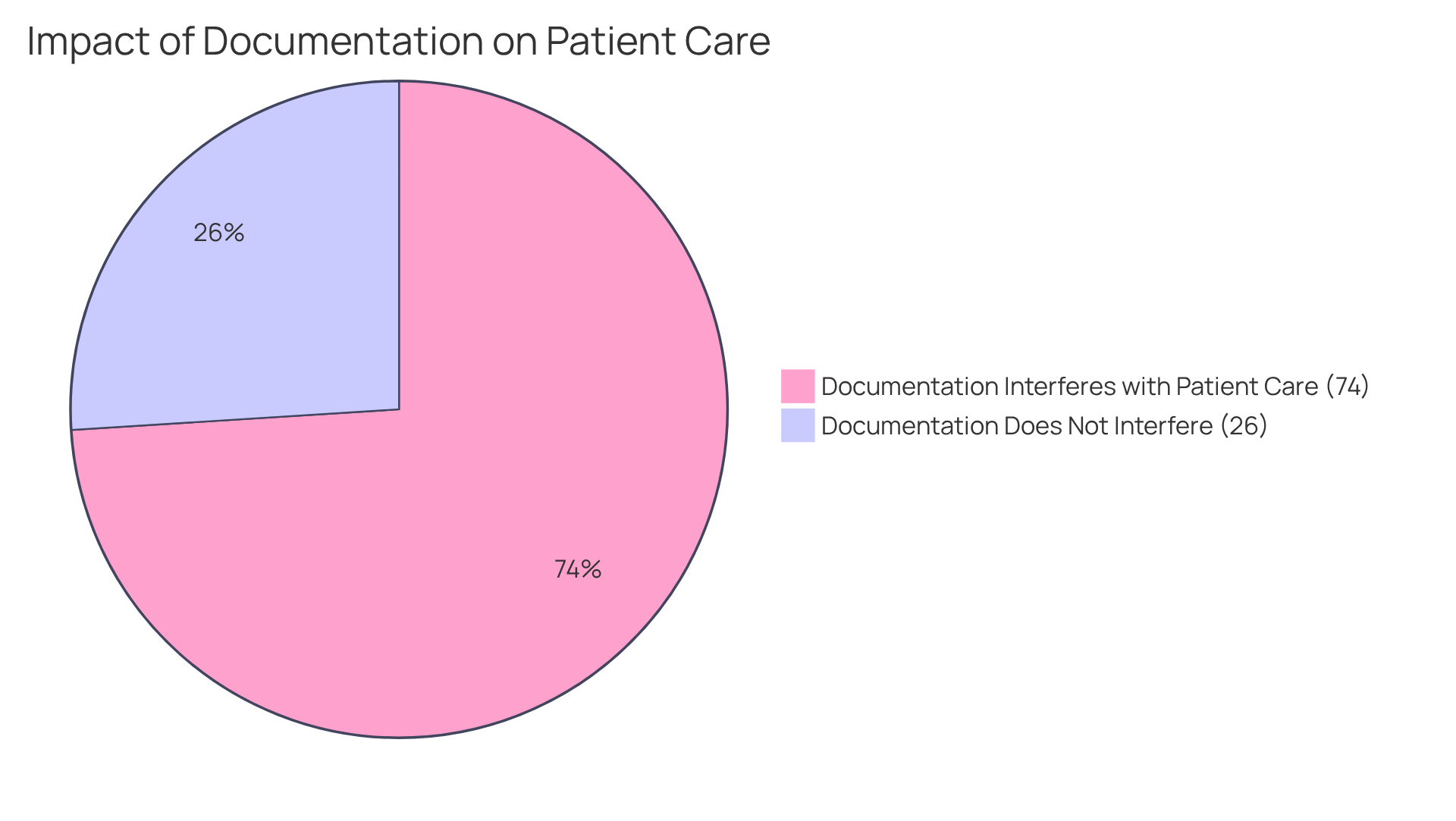
Improved Patient Engagement: Foster Better Communication through EHR Transcriptions
EHR transcriptions are essential for enhancing communication between healthcare providers and individuals. They ensure clear and precise documentation of consultations, which fosters a collaborative approach to care. Have you ever felt uncertain about or treatment plan? This transparency allows individuals to better understand their health, significantly enhancing satisfaction and adherence to treatment recommendations.
In fact, studies show that involved individuals are less likely to neglect their health plans, potentially reducing up to 70% of hospital readmissions. Yet, it’s concerning that half of individuals do not adhere to their health plans, underscoring the necessity of effective communication. Clear records not only facilitate better understanding but also strengthen the provider-patient relationship, ultimately leading to improved health outcomes.
Consider this: patients with negative experiences are three times more likely to change healthcare professionals compared to those with positive experiences. This highlights the critical nature of communication in healthcare. By emphasizing efficient communication through EHR transcriptions, medical professionals can enhance patient involvement and contentment. This aligns with the increasing demand for clarity and availability in medicine. Let’s work together to ensure that every patient feels heard and understood.
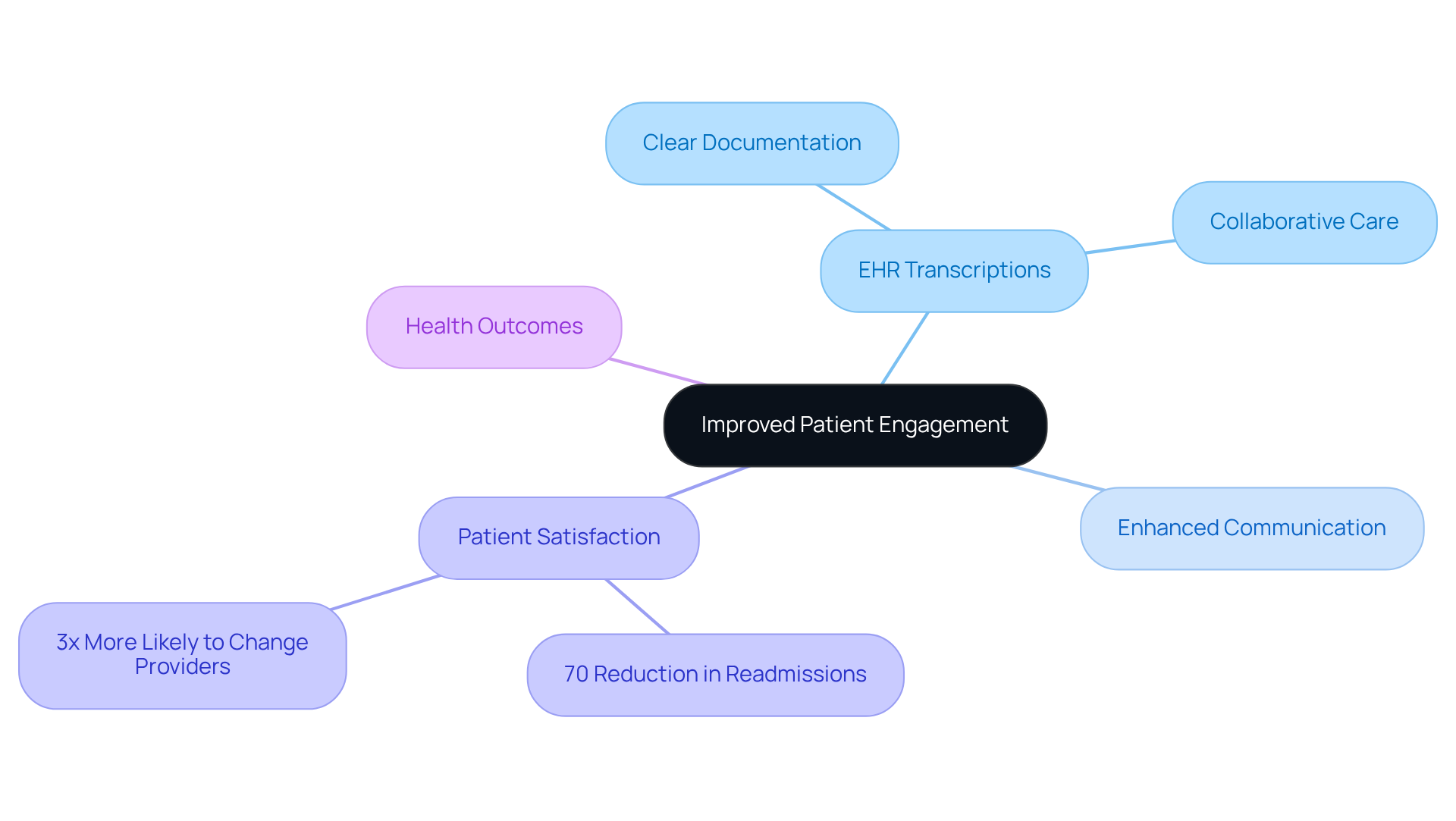
Cost Efficiency: Reduce Operational Costs with EHR Transcription Solutions
Healthcare providers often face emotional challenges due to overwhelming administrative burdens. These pressures can detract from the quality of patient care, leaving many feeling stretched thin. Have you considered how much time and energy is spent on record-keeping? EHR transcriptions provide a compassionate way to alleviate these concerns.
By decreasing reliance on internal documentation personnel, healthcare organizations can significantly reduce operational expenses. Outsourcing these services not only ensures high standards of accuracy and efficiency but also provides a pathway to substantial cost savings. For instance, practices that have transitioned to outsourced have reported savings of up to 40% in transcription-related expenses. A large hospital achieved this remarkable reduction after partnering with Athreon’s Trans|IT service.
This financial flexibility enhances operational efficiency, allowing practices to allocate resources more effectively. Ultimately, this leads to an improvement in the quality of care provided to individuals. With the median annual wage for medical transcriptionists reaching $37,060 as of May 2023, the financial implications of maintaining an in-house team can be daunting.
Outsourcing can lower operational expenses by as much as 30% through economies of scale and specialized knowledge. This positions outsourcing as a strategic option for medical organizations seeking to enhance their operations with EHR transcriptions. Additionally, the costs associated with hiring and training staff further compound the financial burden of in-house teams.
In light of these challenges, consider how outsourcing could not only ease your administrative load but also support your mission to provide exceptional care. It’s time to explore the benefits of outsourcing and take a step toward a more efficient and compassionate healthcare environment.
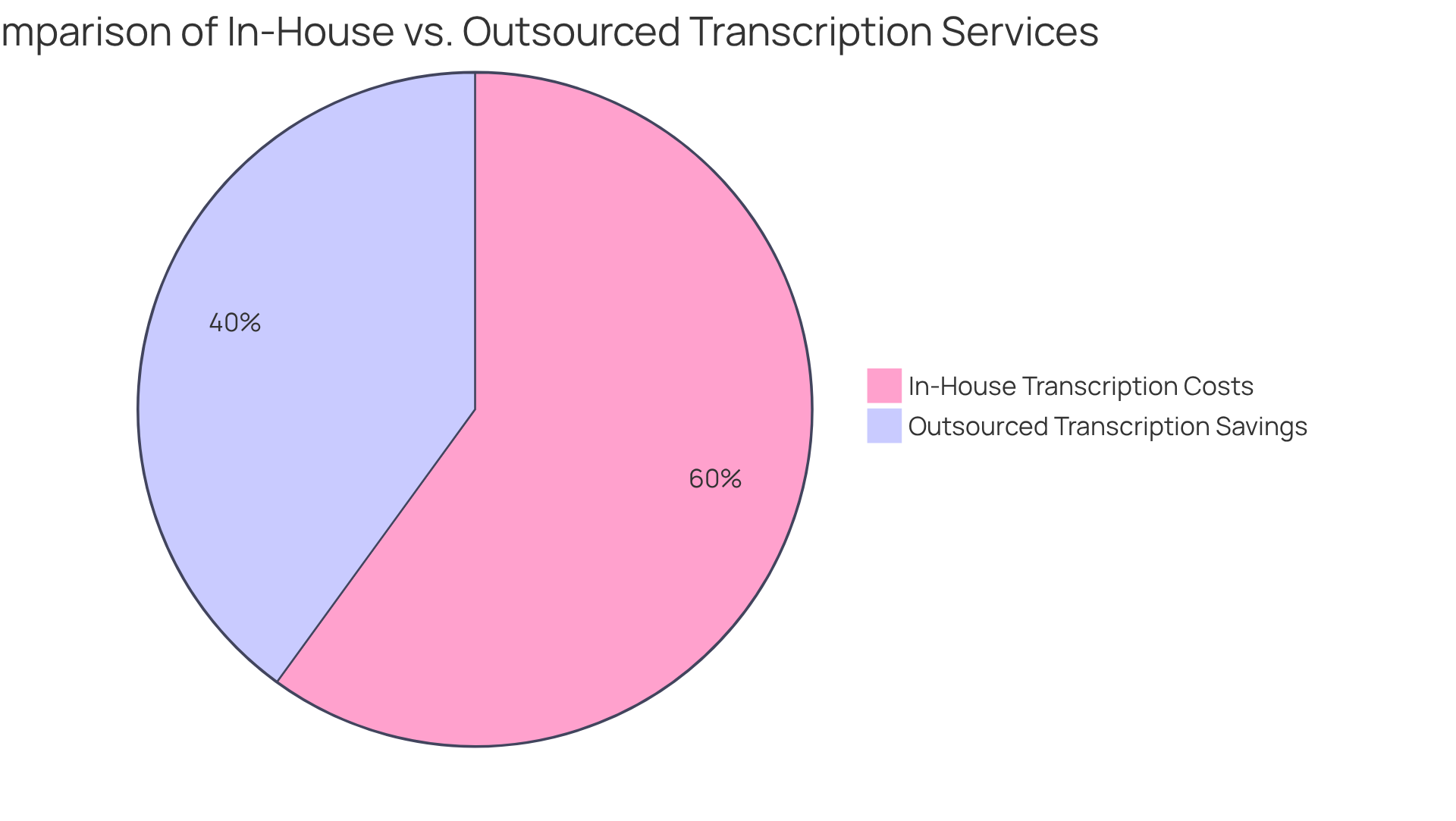
Compliance and Security: Safeguard Patient Data with EHR Transcriptions
EHR documentation services are thoughtfully designed to meet strict regulations, ensuring that individual data is handled with the utmost security and confidentiality. How can healthcare providers protect sensitive client information while maintaining accurate records? By utilizing HIPAA-compliant transcription solutions, they can effectively safeguard this crucial data. This dedication to compliance not only protects individuals but also enhances the reputation of medical organizations, which is essential in an era where medical data breaches have affected over 500 million people.
In 2022, the medical field faced significant challenges, being the top sector impacted by data breaches, with 49 million patient records exposed. With medical services accounting for 79% of all reported data breaches, the stakes are undeniably high. Non-compliance can lead to severe financial repercussions, with the average cost of a data breach in the medical sector soaring to $7.13 million, while in 2022 reached $98,643. Organizations prioritizing data security through HIPAA compliance can also mitigate risks linked to human error, which is responsible for 43% of breaches. Did you know that accidental negligence is twice as likely to occur compared to malicious negligence in HIPAA violations?
Investing in HIPAA-compliant documentation services, such as ehr transcriptions, not only enhances operational integrity but also fosters trust with patients. In a world increasingly reliant on digital solutions, ensuring that sensitive information is protected is more vital than ever. As Christopher Nguyen wisely stated, "When medical documentation is not HIPAA-compliant, individual safety and organizational reputation are at risk." Regular assessments and employee training on HIPAA compliance are essential steps to safeguard individual information. How can you ensure your organization is taking the necessary steps to protect both your patients and your practice?
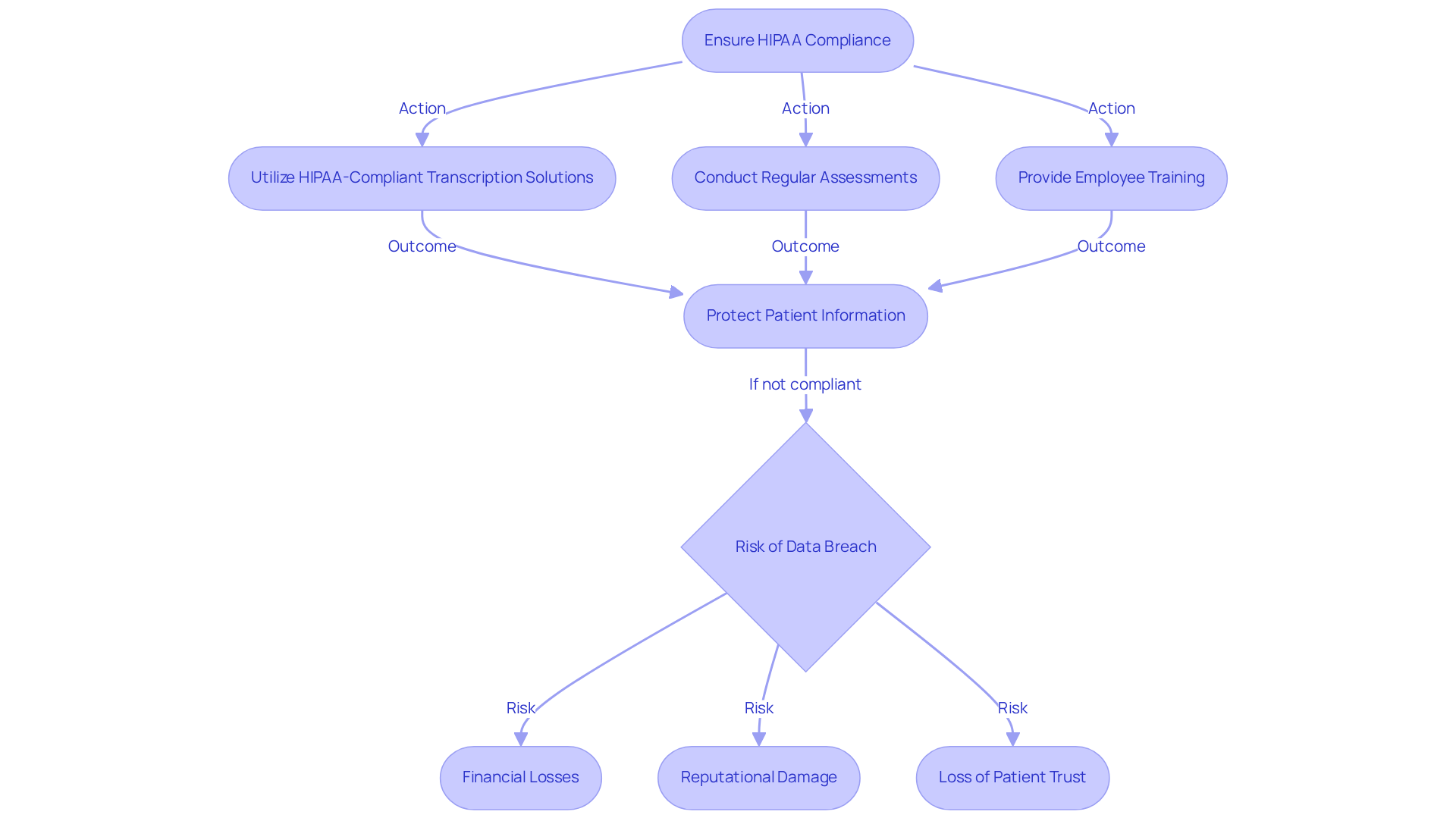
Future Innovations: Explore the Evolving Landscape of EHR Transcription Technology
The landscape of EHR documentation technology is evolving at a remarkable pace, fueled by advancements in artificial intelligence and machine learning that enhance both efficiency and accuracy. Many physicians feel the weight of time-consuming administrative tasks, which can detract from their ability to provide compassionate care. By streamlining processes such as appointment scheduling, medical record management, and billing, healthcare providers can alleviate this burden. Imagine regaining precious time to focus on delivering high-quality assistance to those you serve.
Future innovations promise to include:
- Real-time transcription during consultations
- Seamless integration with EHR systems
- Incorporation of EHR transcriptions with significantly improved natural language processing capabilities
These advancements will not only simplify documentation procedures but also empower medical professionals to offer exceptional care to individuals. Yet, it’s important to acknowledge that face hesitance in embracing these new technologies, often due to concerns about maintaining the quality of care and interactions with patients.
By staying informed about these advancements, practitioners can explore innovative solutions that enhance their operations and elevate the overall standard of medical delivery. How can you leverage these tools to improve your practice and the care you provide? Embrace the potential of these technologies, and together, we can create a more efficient and compassionate healthcare environment.
Quality of Care: Elevate Patient Outcomes with Accurate EHR Transcriptions
Precise ehr transcriptions are essential for improving the quality of care we deliver to individuals. Have you ever felt overwhelmed by the challenge of documenting every clinical interaction accurately? By ensuring thorough documentation through ehr transcriptions, healthcare providers can make informed decisions based on comprehensive individual histories. This accuracy not only leads to better diagnoses and treatment plans but ultimately improves patient outcomes with the help of ehr transcriptions.
Incorporating EHR transcriptions into clinical workflows can help alleviate some of the administrative burdens that often hinder patient care. Imagine a world where you can focus more on your patients, knowing that their histories are meticulously recorded and accessible. This integration promotes a , allowing you to provide the compassionate support your patients deserve.
Together, we can embrace these solutions to enhance our practice and foster better patient relationships. Let’s prioritize accurate documentation for the benefit of our patients and ourselves.
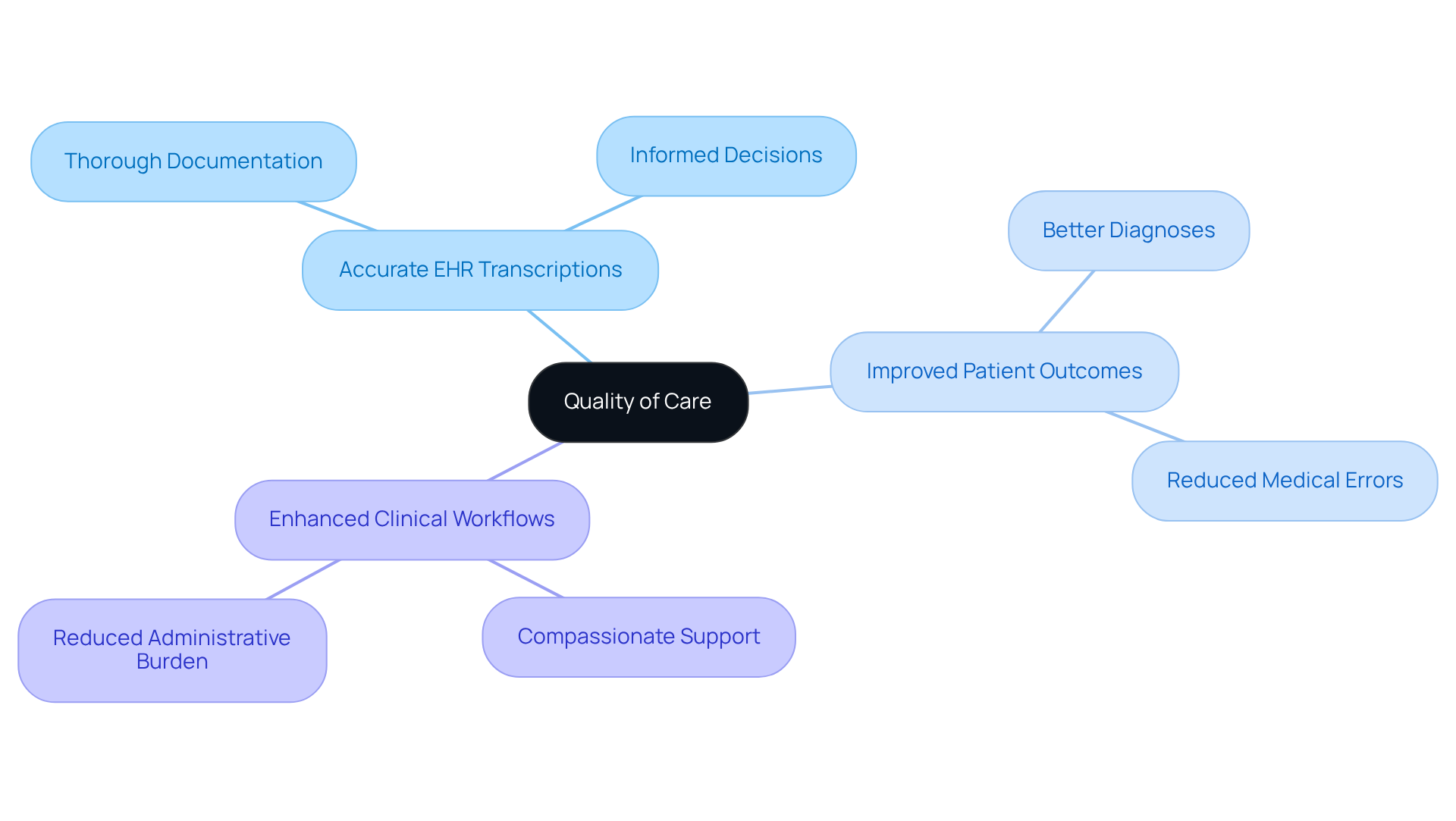
Telehealth Integration: Leverage EHR Transcriptions for Remote Patient Care
EHR records are crucial in telehealth environments, where accurate documentation of virtual consultations is essential. Have you ever felt overwhelmed by the administrative tasks that come with patient care? By integrating documentation services into telehealth platforms, healthcare providers can ensure that every client interaction is recorded with precision, which is vital for maintaining continuity of care. This integration not only improves the quality of remote healthcare but also ensures compliance with documentation standards, enhancing adherence to regulatory requirements.
The benefits of recording services extend far beyond mere documentation. Imagine reclaiming valuable time previously spent on manual data entry, allowing you to focus more on what truly matters: your clients. Studies indicate that healthcare workers often dedicate hours each week to recording and typing medical records. Effective documentation solutions can significantly reduce this burden, enabling providers to prioritize patient interactions.
Moreover, accurate documentation is linked to improved outcomes for those receiving care. Telehealth programs that utilize analytics-driven reminders have demonstrated a remarkable 62% increase in medication adherence compared to traditional care models. This statistic highlights the critical role that plays in fostering better health management practices.
There are countless instances where documentation services have transformed remote healthcare. During the COVID-19 pandemic, many telehealth services reported that incorporating documentation features led to more efficient workflows and heightened client satisfaction. As one telehealth provider expressed, 'Precise documentation is the foundation of effective remote care; it ensures that every detail is captured, which is essential for client safety and treatment success.'
In conclusion, embracing EHR transcriptions within telehealth not only streamlines record-keeping processes but also significantly enhances the overall quality of care provided to patients remotely. Are you ready to explore how these solutions can support your practice and improve patient experiences?
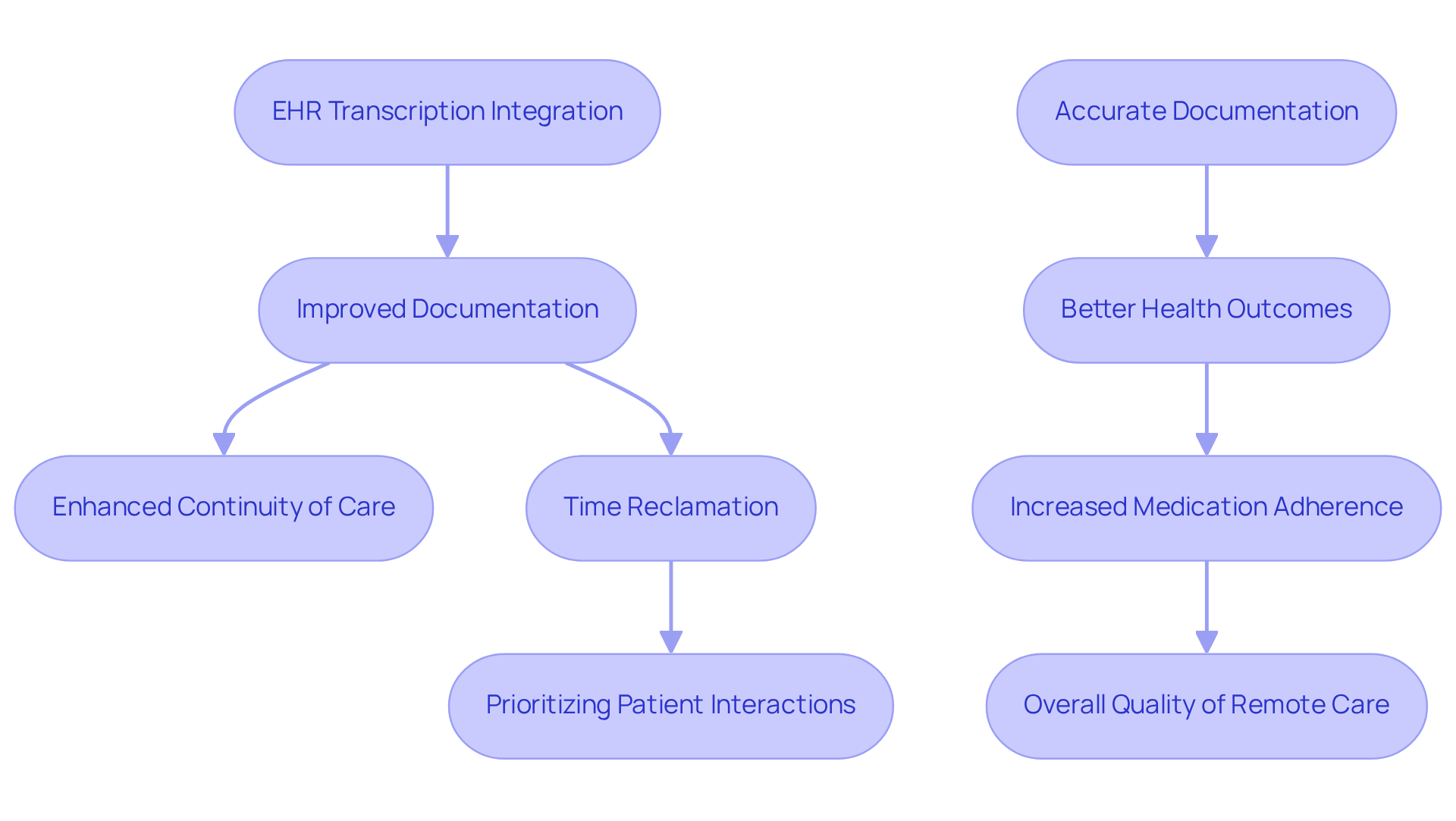
Training and Support: Empower Providers with EHR Transcription Expertise
Healthcare professionals often face emotional challenges due to the complexities of EHR documentation. To truly harness the benefits of EHR services, it’s essential that they receive thorough training and ongoing support. This training should focus on seamlessly integrating transcription into existing workflows, while also guiding professionals on best practices for documentation.
Research shows that can significantly enhance charting and coding accuracy, boost productivity, and improve patient safety. By equipping providers with the necessary skills and knowledge, healthcare organizations can foster a more efficient and accurate documentation process.
This improvement not only streamlines administrative tasks but also nurtures a patient-centered approach to care. Ultimately, this leads to better health outcomes for those we serve. How can you ensure that your team is supported in this journey? Let's work together to create a more compassionate and effective healthcare environment.
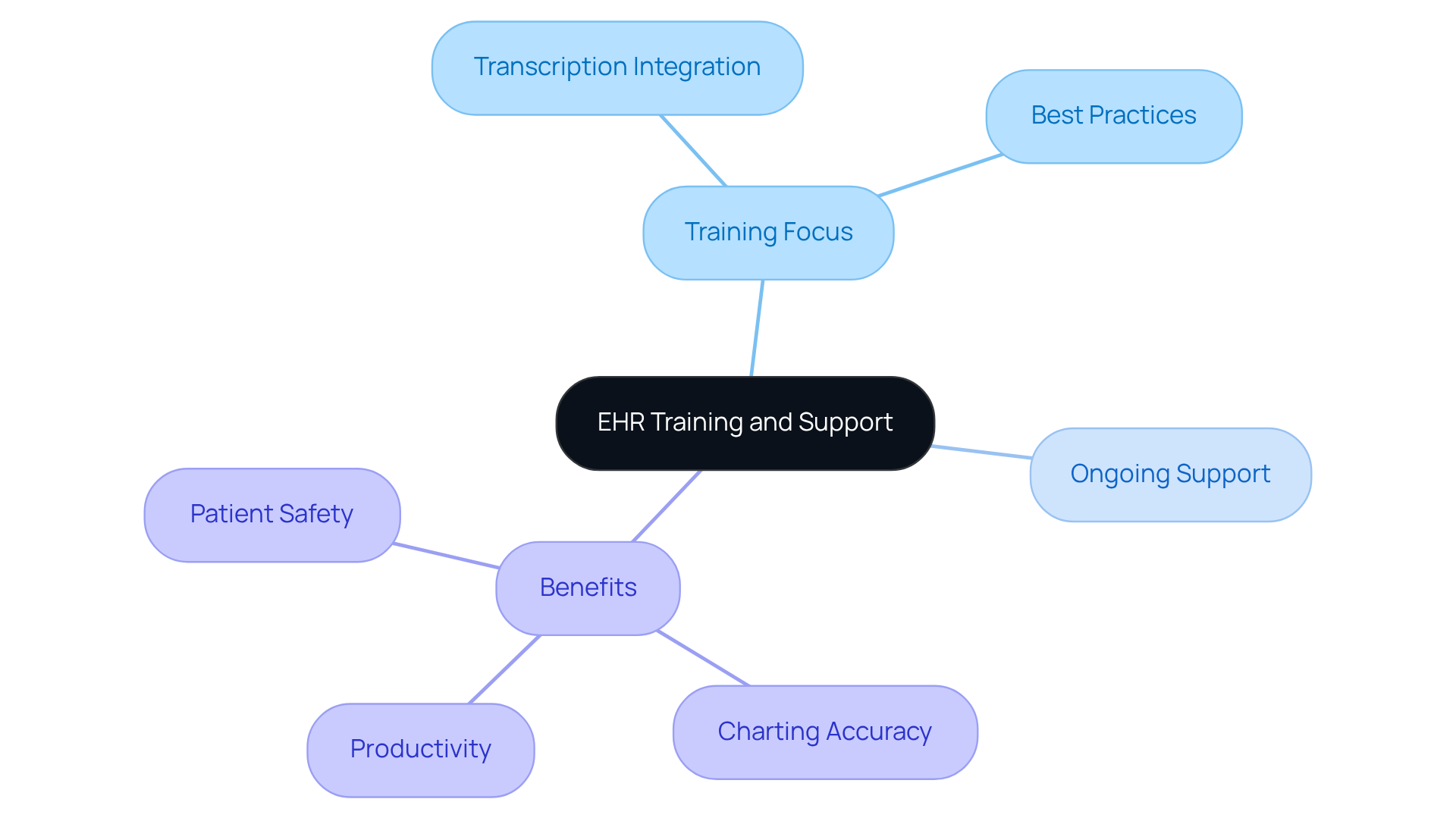
Conclusion
EHR transcriptions are a significant advancement in healthcare, helping providers ease the burdens of administrative tasks while enhancing the quality of patient care. By streamlining documentation processes, these solutions improve accuracy and efficiency, enabling healthcare professionals to focus on their core mission: delivering compassionate and effective care to their patients.
Throughout this article, we have explored various benefits of EHR transcriptions. These include:
- Enhanced accuracy in patient records
- Significant time savings
- Improved patient engagement through better communication
- Cost efficiency for healthcare organizations
Additionally, HIPAA-compliant transcription services reinforce the compliance and security of patient data, ensuring sensitive information is safeguarded. As EHR technology evolves, it promises further innovations, making it essential for healthcare providers to stay informed and adapt to these advancements.
Ultimately, embracing EHR transcriptions is not merely about adopting new technology; it is a commitment to transforming the healthcare experience for both providers and patients. By prioritizing accurate documentation and fostering better communication, healthcare organizations can elevate the standard of care, reduce burnout among providers, and enhance patient satisfaction.
Isn’t it time to explore and implement EHR transcription solutions? Together, we can create a more efficient, compassionate, and patient-centered healthcare environment. The call to action is clear: let’s take this step forward for the benefit of everyone involved.




